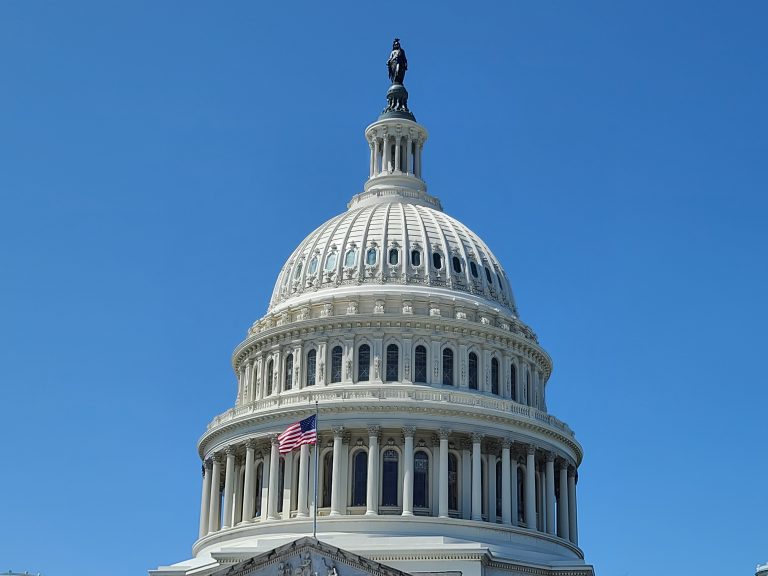A bipartisan group of 20 senators announced on Sunday they have agreed on a framework for new gun legislation.
The framework includes nine reforms targeting gun sales, mental health services, and school security. The framework is light on details but includes policies such as funding for state “red flag” legislation and emergency mental health services.
“Today, we are announcing a commonsense, bipartisan proposal to protect America’s children, keep our schools safe, and reduce the threat of violence across our country,” the group said in a press release. “Families are scared, and it is our duty to come together and get something done that will help restore their sense of safety and security in their communities.”
The framework deal comes in the wake of the mass shooting in Uvalde, Texas where a gunman murdered 19 children and two teachers. It represents the first major bipartisan framework to include new gun restrictions in decades. The inclusion of support from ten Republicans in the deal indicates there is a greater chance than ever new gun-control legislation will make into federal law.
Senators Chris Murphy (D-Conn.), John Cornyn (R-Texas), Thom Tillis (R-N.C.), Kyrsten Sinema (D-Ariz.), Richard Blumenthal (D-Conn.), Roy Blunt (R-Mo.), Cory Booker (D- N.J.), Richard Burr (R-N.C.), Bill Cassidy (R-La.), Susan Collins (R-Maine), Chris Coons (D-Del.), Lindsey Graham (R-S.C.), Martin Heinrich (D-N.M.), Mark Kelly (D-Ariz.), Angus King (I-Maine), Joe Manchin (D-W.Va.), Rob Portman (R-Ohio), Mitt Romney (R-Utah), Debbie Stabenow (D-Mich.), and Pat Toomey (R-Pa.) all joined the press release. They argued the framework of reforms balances preventing new mass shootings with respecting the Second Amendment.
The proposal includes a model “red flag” law with funding for optional state adoption, expansion of model mental health crisis intervention program already operating in some states, and “an investigative period to review juvenile and mental health records” for gun buyers under 21-years-old. The package also includes clarification on who needs to obtain a federal license to legally sell guns, expanding gun prohibitions to those convicted of domestic violence misdemeanor against intimate partners they don’t live with, and funding for school safety measures. It also has new punishments for those who buy guns for people who are not allowed to own them.
“Our plan increases needed mental health resources, improves school safety and support for students, and helps ensure dangerous criminals and those who are adjudicated as mentally ill can’t purchase weapons,” the senators said. “Most importantly, our plan saves lives while also protecting the constitutional rights of law-abiding Americans.”
However, the framework has a long way to go. Each proposal is only followed by a single sentence explaining what it would do. Many of them are only partially explained in the press release.
For instance, the framework just says the proposal to clarify federal gun dealing licenses “cracks down on criminals who illegally evade licensing requirements” without providing further information. While senators have publicly discussed adding some juvenile criminal records to the National Instant Criminal Background Check System, the framework’s brief description of this proposal could be read to create a new non-instant background check process for those under 21-years-old. It is unclear how quickly full text of the proposal will be ready or how detailed discussions of the proposals have been thus far.
President Joe Biden (D.), Majority Leader Chuck Schumer (D., N.Y.), and Speaker of the House Nancy Pelosi (D., Calif.) backed the deal on Sunday and advocated for its quick passage. Minority Leader Mitch McConnell (R., Ky.) also applauded efforts to work out the deal, though he did not outright endorse it.
A few other key senators have yet to get on board, though. None of the ten Republicans who signed on to the framework face reelection in this cycle and many are set to retire at the end of their current term. Moderate members of the Democratic caucus, such as Senators Angus King (I., Maine) and Jon Tester (D., Mont.), were also absent from the press release.
Roy Loewenstein, a spokesman for Tester, said the senator has not made a decision on the framework yet.
“As a proud gun owner and defender of the 2nd Amendment, Senator Tester is reviewing the gun safety framework,” he said. “As he has said many times, he believes Congress should act to protect our communities and keep guns out of the hands of those who are a danger to themselves or others.”
Major gun-control groups, including Everytown, Giffords, and March for Our Lives, have praised the deal.
“This is a first step and it’s actually a lot more than I thought it would be,” David Hogg, a co-founder of March for Our Lives, tweeted. “This is progress even if small. Even if it stops one parkland it’s worth it.”
Gun-rights groups have had the opposite reaction. Gun Owners of America and the Firearms Policy Coalition voiced strong disapproval for the package with the former claiming Republicans are “compromising your rights and getting nothing in return.” The National Rifle Association praised efforts to boost school security and mental health funding but said it wouldn’t take a final position until text of the proposals is actually released.
“NRA will continue to oppose any effort to insert gun control policies, initiatives that override constitutional due process protections & efforts to deprive law-abiding citizens of their fundamental right to protect themselves/loved ones into this or any other legislation,” the group tweeted.
With McConnell and senators such as Marco Rubio (R., Fla.) and Lisa Murkowski (R., Alaska) not yet on board with the proposal, support for the deal could still expand as negotiations move forward. The senators who signed on to the framework said they planned to try and convince the skeptics to come on board in the near future.
“We look forward to earning broad, bipartisan support and passing our commonsense proposal into law,” they said.
However, the complex details of how to actually legislate the basic proposals agreed to in the framework could prove vexing for the deal and it is equally likely the whole thing could fall apart. Congress has experienced periods of bipartisan progress on gun bills only to see talks breakdown. The details of a proposal and the speed at which it is considered often determine whether it is successful.
But those involved in the process also understand how negotiations have fallen apart in the recent past. So, it’s likely they will draft the text and move for a vote as quickly as possible, and achieving a framework with support from ten Republicans represents a higher watermark than during previous negotiations.







4 Responses
I don’t strongly object to any of these measures, in principle, but what the heck do they intend to accomplish with stuff like “enhanced penalties for straw buyers?” The executive branch already REFUSES with near unanimity to prosecute these crimes, what does the penalty matter for a crime that is almost never prosecuted?
And more mental health funding is a joke, SAMSHA will just hoover it all up and redirect it to “anti-stigma awareness campaigns” and feel-good ad buys, instead of actually trying to serve the dangerously mentally ill.
Would be nice if the desperate-to-be-seen-as-bipartisan club actually tried to get something gun owners want too, in return for restrictions on gun rights.
Would love to have seen the 1990 Gun Free School Zones Act repealed in the framework, leaving it up to the states to come up with their experiments, but am opposed even to the “red flag laws” grant concept.
A person *might* commit a crime, due to a totality of the preponderance of the evidence that they *might* be a danger to themselves or others? I’m understanding so far that predicting violent and/or criminal behavior is difficult at best. And this is still under the protection of an enumerated Constitutional right.
Let’s look at the effectiveness of “red flag laws” (is there enough data? And even if effective the vast majority of times, is it unconstitutional still, and have some cases been unethically infringed upon?) And I like my NRA’s position.
By definition, a “compromise” means side each gives and takes. As there appears to be nothing in this proposal that enhances the self-defense rights of law-abiding citizens, it is entirely proper for gun rights groups to adamantly oppose it.
Open Source Defense has the right take on this bad deal: https://opensourcedefense.substack.com/p/osd-173-the-evolution-of-compromise